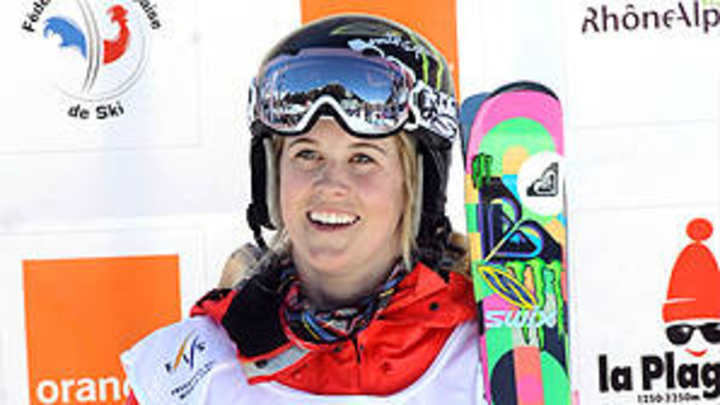Legacy of Sarah Burke will live on in Olympic freestyle skiing

They'll be there to cheer the men's and women's halfpipe competition for the 2014 Sochi Winter Olympics. And for the first time, thanks to a decision made by the IOC last spring, they'll be treated to a discipline called halfpipe skiing. In the same pipe used by snowboarders such as defending gold medalists Shaun White and Torah Bright, freestyle skiers will soar and spin their way through a breathtaking menu of highly technical flips and twists. Truth is, because both feet aren't strapped to the same board, the skiers will get a little more air -- "amplitude" is the noun of choice -- affording them milliseconds to be even a little more daring and creative than the 'boarders.
Even though it's been around for more than a decade, freestyle skiing will take a giant step in Sochi -- it will thrust itself into the mainstream. It's because it's TV friendly, and the Olympics will give it an international audience. It's because the sport is thrilling, and carries more than a slight whiff of danger.
And it's because of the pluck and persistence of a woman who won't be around to see her sport make its Olympic debut. Sarah Burke, a four-time Winter X Games champion, died Thursday at the University of Utah Hospital in Salt Lake City. While attempting a fairly routine (for her) 540-degree flat spin the Park City superpipe on Jan. 10, she took a hard fall, rupturing one of the four main arteries that carry blood to the brain. She immediately went into cardiac arrest. Surgery to repair the artery could not reverse the brain damage she'd already suffered. Surrounded by close friends and family, including her husband, the freestyle skier Rory Bushfield, she was taken off life support Thursday morning, after which her organs were donated. Her agent has since established a website to defray the roughly half-million-dollar cost of her hospital stay.
Burke, from Squamish, British Columbia, ruled the X Games, but lacked the high profile of her snowboarding equals, the Brights and Hannah Teters and Kelly Clarks of the world. That's because freestyle skiing wasn't on the Winter Olympic Games program.
Not until she made it her mission, it wasn't. The same way Burke argued and wheedled her way into competitions as a teenager -- in those days she was turned away because event organizers didn't include divisions for women -- she was a tireless and effective advocate for her sport. Once it accepted her. As ESPN's Alyssa Roenigk writes in her elegant tribute, "She pressed the X Games to include women's skiing slopestyle, which organizers added to the event in 2009, and vocally campaigned for her sport's inclusion in the Winter Olympics."
It doesn't matter that the crash that took her life occurred during a trick she'd successfully executed a thousand times before. It serves as a reminder that many of the high-speed, high-altitude entertainments served up during the Winter Games -- X and Olympic -- come with genuine peril. Burke's accident took place at the same venue where Kevin Pearce nearly died on Dec. 31, 2009. Pearce over-rotated on a fiendishly difficult double-cork spin, and slammed into the wall forehead-first, suffering a major, traumatic brain injury that changed his life and ended his career as a pro snowboarder. Like Burke, he was airlifted to the University of Utah Hospital. Unlike Burke, Pearce survived.
"Every time these guys go for it, it's a leap of faith," says Jake Burton, the snowboarding pioneer and magnate. The halfpipe "is just getting more challenging. And dangerous."
That's true, whether you're flying through the air upside-down on one board or two. With ski halfpipe now an Olympic sport, there will be pressure to go bigger. And courageous, ambitious young people will continue to be airlifted from superpipes to trauma centers. But, if that danger didn't exist, the X Games and Winter Olympics wouldn't be quite so riveting, would they?
While he still suffers from after-effects of his injury, Pearce is sharp and lucid, just as he was before he hit the wall on New Year's Eve in '09. He was in the news because finally, just shy of two years after his crash, he was ready to get back on that horse. On Dec. 13 at Breckenridge in Colorado, Pearce -- accompanied by several hundred boisterous well wishers -- went snowboarding for the first time since his accident.
He's now an aspiring TV sports commentator -- and very good at it. I fully expect to see Pearce at the bottom of the halfpipe in Sochi, explaining the sometimes mystifying maneuvers, making them accessible to a worldwide audience.
Sarah Burke will also be a strong, if invisible, presence at the Krasnaya Polyana ski resort, particularly when women like her longtime American rival Jen Hudak drop in and start throwing tricks in the first-ever Olympic ski halfpipe.
"I am eternally indebted to Sarah for what she has done for this sport," said Hudak. "Every turn I ever make will be for her."
